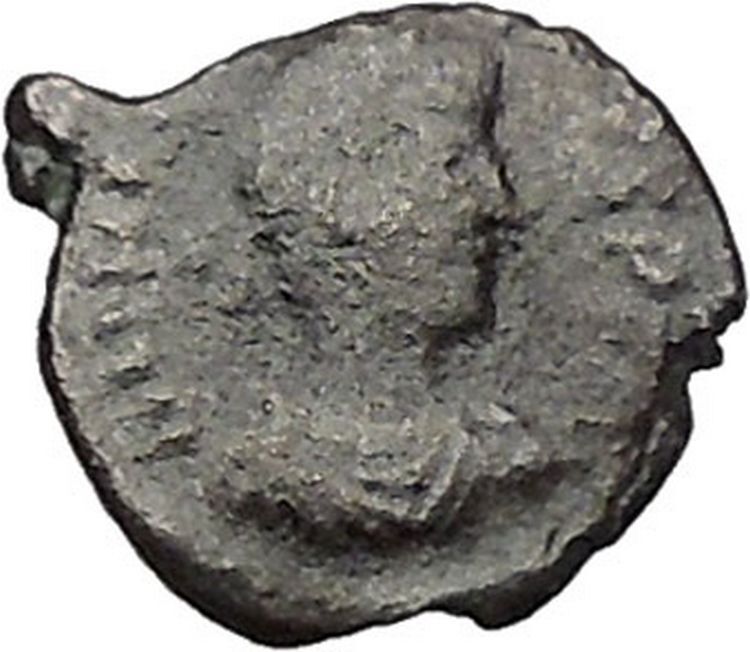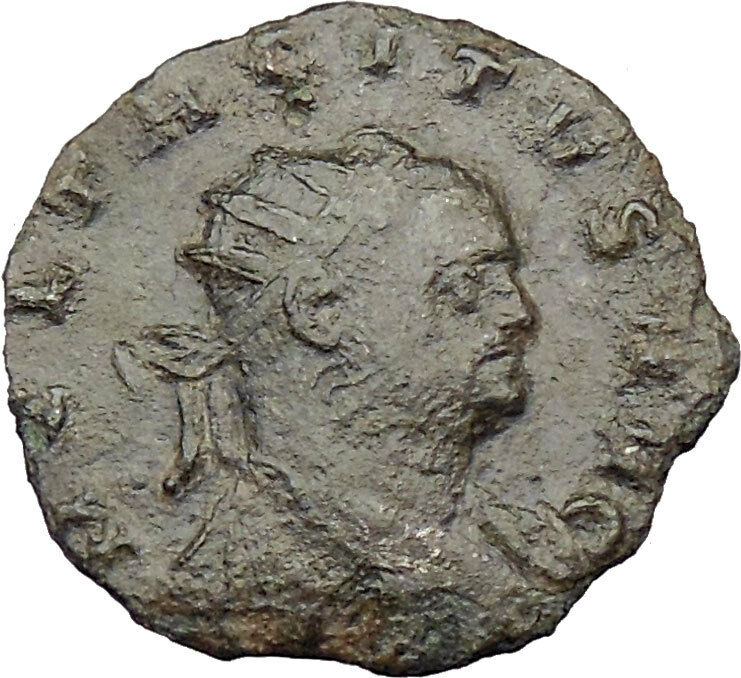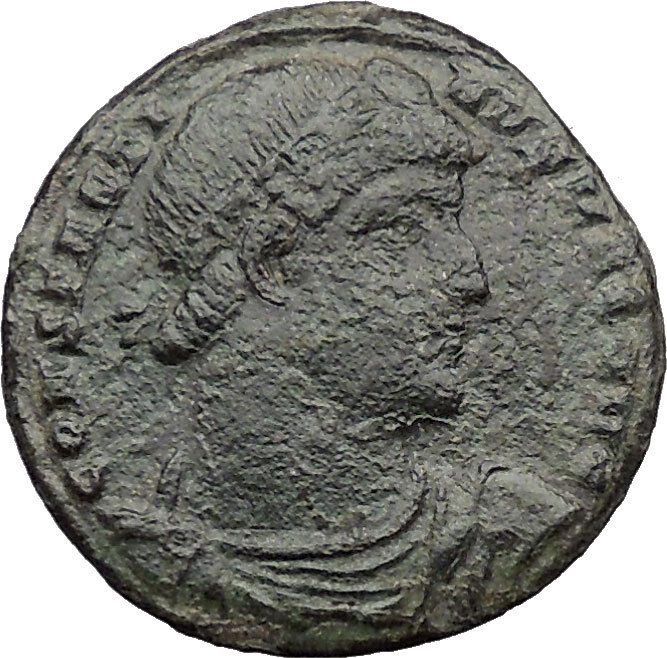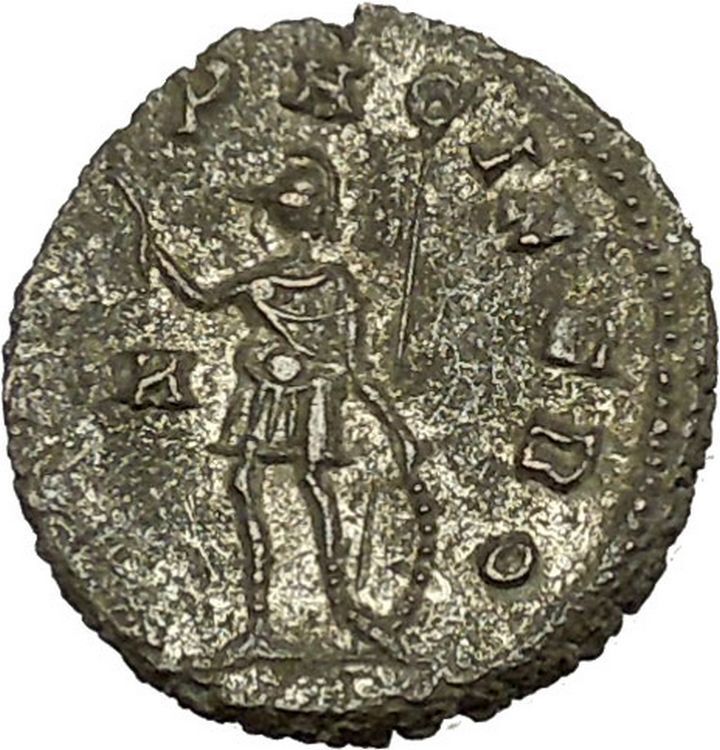|
Tacitus – Roman Emperor: 275-276 A.D.
Silvered Bronze Antoninianus 23mm (4.53 grams) Rome mint, struck January-June 276 A.D.
Reference: Estiot 1115; La Venera hoard 1679; RIC 84 var.; RIC on line 3578
IMP C M CL TACITVS AVG Radiate bust of Tacitus to right, with slight drapery on his far shoulder.
CLEMENTIA TEMP / XXIZ Clementia standing facing, her head to left and with her legs crossed, leaning her left elbow on a low column and holding a long scepter with her right hand.
You are bidding on the exact item pictured, provided with a Certificate of Authenticity and Lifetime Guarantee of Authenticity.
 In Roman mythology, Clementia was the goddess of clemency, leniency, mercy, forgiveness, penance, redemption, absolution and salvation. In Roman mythology, Clementia was the goddess of clemency, leniency, mercy, forgiveness, penance, redemption, absolution and salvation.
She was defined as a celebrated virtue of Julius Caesar, who was famed for his forbearance, especially following Caesar’s civil war with Pompey from 49 BC. In 44 BC, a temple was consecrated to her by the Roman Senate, possibly at Caesar’s instigation as Caesar was keen to demonstrate that he had this virtue.
In a letter to his friend Atticus, Cicero is discussing Caesar’s clementia: “You will say they are frightened. I dare say they are, but I’ll be bound they’re more frightened of Pompey than of Caesar. They are delighted with his artful clemency and fear the other’s wrath.” Again in Pro rege Deiotaro (For King Deiotarus) Cicero discusses Caesar’s virtue of clementia.
There is not much information surrounding Clementia’s cult; it would seem that she was merely an abstraction of a particular virtue, one that was revered in conjunction with revering Caesar and the Roman state. Clementia was seen as a good trait within a leader, it also the Latin word for “humanity” or “forbearance”. This is opposed to Saevitia which was savagery and bloodshed. Yet, she was the Roman counterpart of Eleos, (not to be confused with Soteria), the Greek goddess of mercy and forgiveness who had a shrine in Athens.
In traditional imagery, she is depicted holding a branch (possibly an olive tree branch) and a scepter and may be leaning on a column.
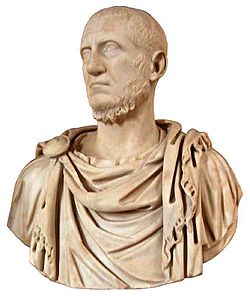 Marcus Claudius Tacitus (ca. 200 – June 276) was a Roman Emperor from September 25 275, to June 276. Marcus Claudius Tacitus (ca. 200 – June 276) was a Roman Emperor from September 25 275, to June 276.
He was born in Interamna (Terni), in Italia. He circulated copies of the historian Gaius Cornelius Tacitus’ work, which was barely read at the time, and so we perhaps have him to thank for the partial survival of Tacitus’ work; however, modern historiography rejects his claimed descent from the historian as forgery. In the course of his long life he discharged the duties of various civil offices, including that of consul in 273, with universal respect.
After the assassination of Aurelian, he was chosen by the Senate to succeed him, and the choice was cordially ratified by the army. His first action was to move against the barbarian tribes that had been gathered by Aurelian for his Eastern campaign, and which had plundered the Eastern Roman provinces after Aurelian had been murdered and the campaign cancelled. His half-brother, the Praetorian Prefect Florianus, and Tacitus himself won a victory against these tribes, among which Heruli, which granted the emperor the title Gothicus Maximus.
Tacitus probably died of fever (according to Aurelius Victor, Eutropius and the Historia Augusta) – though Zosimus claims he was assassinated – at Tyana in Cappadocia in June 276.
|





 In Roman mythology, Clementia was the goddess of clemency, leniency, mercy, forgiveness, penance, redemption, absolution and salvation.
In Roman mythology, Clementia was the goddess of clemency, leniency, mercy, forgiveness, penance, redemption, absolution and salvation. Marcus Claudius Tacitus (ca. 200 – June 276) was a Roman Emperor from September 25 275, to June 276.
Marcus Claudius Tacitus (ca. 200 – June 276) was a Roman Emperor from September 25 275, to June 276.

